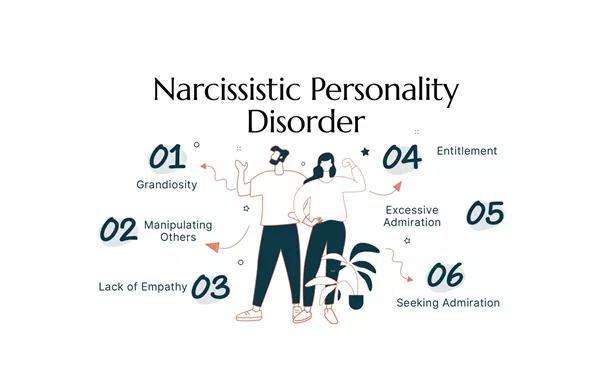Understanding Narcissism: Tests, Types, and How to Identify It
November 25, 2024 | By Rowan Thorne
Unveiling Narcissism: What It Is and Why It Matters
Narcissism is a complex personality trait often associated with an inflated sense of self-importance, a need for admiration, and a lack of empathy. While the term is frequently used informally, understanding its clinical implications is critical for fostering self-awareness and better interpersonal relationships.

From influencing workplace dynamics to shaping personal connections, narcissistic tendencies can have a profound impact. Exploring whether these traits exist within ourselves or others through scientifically-backed tools can pave the way for self-growth and healthier interactions.
Types of Narcissist Tests
Grandiose vs. Vulnerable Narcissism Tests
Narcissism is not a one-size-fits-all concept. It is broadly categorized into two subtypes:

- Grandiose Narcissism:
- Characteristics: Confidence, arrogance, and dominance.
- Test Focus: Measures traits like self-assurance and a sense of entitlement.
- Vulnerable Narcissism:
- Characteristics: Insecurity, hypersensitivity, and a fear of rejection.
- Test Focus: Evaluates emotional fragility and covert behaviors.
Taking a test tailored to these subtypes provides a nuanced understanding of how narcissistic traits manifest.
Comprehensive Narcissistic Personality Disorder Tests
For those seeking a deeper understanding of their tendencies, Narcissistic Personality Disorder (NPD) tests provide comprehensive evaluations. These tests typically explore:
- Patterns of manipulation or exploitation.
- Emotional detachment and lack of empathy.
- An excessive need for admiration.
Free Online Narcissist Tests
Free online narcissism tests are user-friendly tools that provide quick insights into your personality traits, helping you start your journey toward self-awareness.These tests:

- Help users self-assess tendencies through structured questions.
- Provide results with interpretative guides.
- Encourage further exploration with professional advice if needed.
While not diagnostic, such tools are an excellent starting point for self-awareness.Users can take these narcissist tests to gain a preliminary understanding of their tendencies, fostering self-awareness and guiding them toward further exploration if required.
Popular Narcissist Tests
1. Narcissistic Personality Inventory (NPI)
The NPI is one of the most widely used tools to assess narcissism. It measures characteristics such as leadership, authority, and superiority. This test is particularly suited for identifying grandiose traits and is often used in research and clinical settings.
2. Pathological Narcissism Inventory (PNI)
The PNI focuses on both grandiose and vulnerable dimensions of narcissism. It includes questions that examine emotional sensitivity, exploitative tendencies, and internal struggles with self-worth.
3. Single-Item Narcissism Scale (SINS)
SINS is a quick and straightforward tool that asks one key question: "To what extent do you agree with the statement: 'I am a narcissist'?" Research shows that individuals with narcissistic tendencies are often willing to self-identify, making this a surprisingly effective measure.
How to Identify Narcissistic Traits
Behavioral Signs of Narcissism
Narcissistic traits can manifest in various ways. Common signs include:

- An Exaggerated Sense of Self-Importance: Believing oneself to be superior or unique.
- A Need for Constant Admiration: Seeking validation and praise to sustain self-esteem.
- Lack of Empathy: Difficulty understanding or caring about others’ feelings.
- Manipulative Behaviors: Exploiting others for personal gain.
Recognizing these behaviors in oneself or others is the first step toward addressing them. Start with a narcissist test to explore your traits.
Differences Between Confidence and Narcissism
It’s crucial to distinguish between confidence and narcissism:
- Confidence:
- Rooted in competence and self-assurance.
- Allows room for others’ opinions and achievements.
- Narcissism:
- Often fragile and dependent on external validation.
- Involves dismissing or devaluing others to maintain self-importance.
Understanding this distinction can clarify whether certain traits are adaptive or problematic.
Misconceptions About Narcissistic Behavior
Narcissism is frequently misunderstood. Common misconceptions include:
- All Narcissists Are Extroverted: Vulnerable narcissists may be introverted and struggle with insecurity.
- Narcissists Are Incapable of Change: With awareness and intervention, behaviors can improve.
- Narcissism Is Always Maladaptive: Certain traits, such as ambition, can be channeled positively.
Debunking these myths helps foster a more accurate and empathetic understanding of the condition.
Common Questions About Narcissism
Understanding narcissism requires addressing some of the most commonly asked questions about its traits, effects, and misconceptions. Let’s explore these inquiries to provide clarity and actionable insights.
Do Narcissists Know They Are Narcissists?
Not all narcissists are aware of their tendencies. While some may recognize specific behaviors, they often rationalize or justify them as necessary or beneficial. A lack of self-awareness is common, particularly in those with grandiose narcissism, as their inflated sense of self can cloud introspection. However, with tools like narcissist tests, individuals can begin identifying these patterns and consider seeking help if needed.
Can Depression Be Mistaken for Narcissism?
Yes, depression and narcissism can sometimes appear similar, particularly when narcissistic traits mask underlying sadness or feelings of inadequacy. For example:
- Overcompensation: A narcissist might project confidence to hide feelings of low self-worth.
- Social Withdrawal: Both depression and vulnerable narcissism can lead to isolation.
- Mood Swings: Emotional instability is a hallmark of both conditions, though the underlying causes differ.
The emphasis should remain on self-assessment tools, not professional evaluation.
What Other Conditions Are Confused with Narcissism?
Several psychological conditions share overlapping traits with narcissism, including:
- Borderline Personality Disorder (BPD): Intense emotional fluctuations and fear of abandonment can mimic certain narcissistic tendencies.
- Antisocial Personality Disorder (ASPD): Manipulative behaviors and lack of empathy are traits shared by both conditions.
- Histrionic Personality Disorder (HPD): A need for attention and dramatic behavior is sometimes mistaken for narcissism.
Each condition has distinct diagnostic criteria, making professional evaluation essential for accurate identification.
Practical Steps if You Think You're a Narcissist
Recognizing narcissistic tendencies is a courageous first step toward self-improvement. Here’s how to proceed:
Taking a narcissist test is a non-judgmental way to explore your traits. These self-assessment tools are designed to provide clarity and foster a deeper understanding of your personality.
Self-Reflection and Awareness

- Acknowledge Patterns: Pay attention to behaviors such as constant seeking of admiration, difficulty in accepting criticism, or lack of empathy.
- Journal Your Thoughts: Documenting your reactions to daily interactions can help reveal recurring narcissistic traits.
- Use Online Tools: Engage with structured narcissist tests to identify specific tendencies and areas for improvement.
Seeking Professional Help

- Consult a Therapist: A qualified mental health professional can provide a comprehensive assessment and personalized strategies for change.
- Participate in Counseling: Using tools like narcissist tests can help you identify patterns and gain insights into your behaviors, which can guide further exploration if needed.
- Join Support Groups: Engaging with others on a similar journey fosters accountability and emotional support.
Managing Relationships with Narcissistic Tendencies
- Practice Active Listening: Focus on understanding others’ perspectives without immediately relating them back to yourself.
- Set Relationship Goals: Work on fostering empathy and creating balance in personal and professional relationships.
- Apologize When Necessary: Recognizing and addressing mistakes can repair trust and build healthier connections.
FAQ Section
What Is the Most Accurate Narcissist Test?
The Narcissistic Personality Inventory (NPI) is a commonly used tool for assessing narcissistic tendencies, focusing on grandiosity traits. The Pathological Narcissism Inventory (PNI) offers insights into both grandiose and vulnerable aspects of narcissism.
How Do I Know if I’m a Narcissist or Not?
Self-reflection paired with validated narcissist tests can offer clarity. Look for recurring behaviors such as seeking excessive attention, dismissing others' needs, or reacting strongly to criticism. For a definitive understanding, consult a mental health professional.
What Is the No Smiling Test for Narcissism?
This test gauges how individuals respond to humor, particularly when it’s directed at themselves. A narcissist might react defensively or refuse to laugh, as their need for control and admiration conflicts with self-deprecating humor.
Can Someone Be a Narcissist and Not Know It?
Yes, narcissistic traits can go unnoticed due to lack of introspection or denial. Regular self-assessments and feedback from others can help reveal hidden tendencies.
Moving Forward: Navigating Narcissism with Clarity and Confidence
Recognizing narcissistic traits is not an endpoint but a beginning. By committing to self-awareness, seeking support, and working on personal growth, individuals can transform harmful patterns into healthier behaviors.
Using structured tools like narcissist tests, you can embark on a journey of self-discovery.
Taking a quick narcissist test is an excellent first step to understanding your personality traits and identifying areas for growth. This process can help lay the foundation for healthier relationships and better self-awareness.